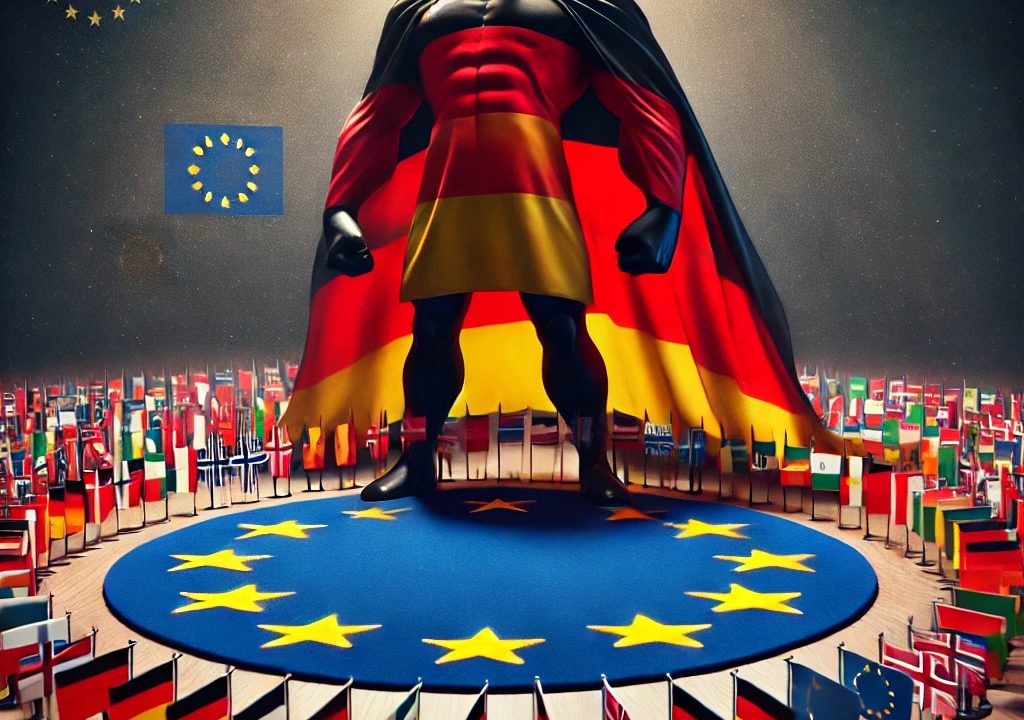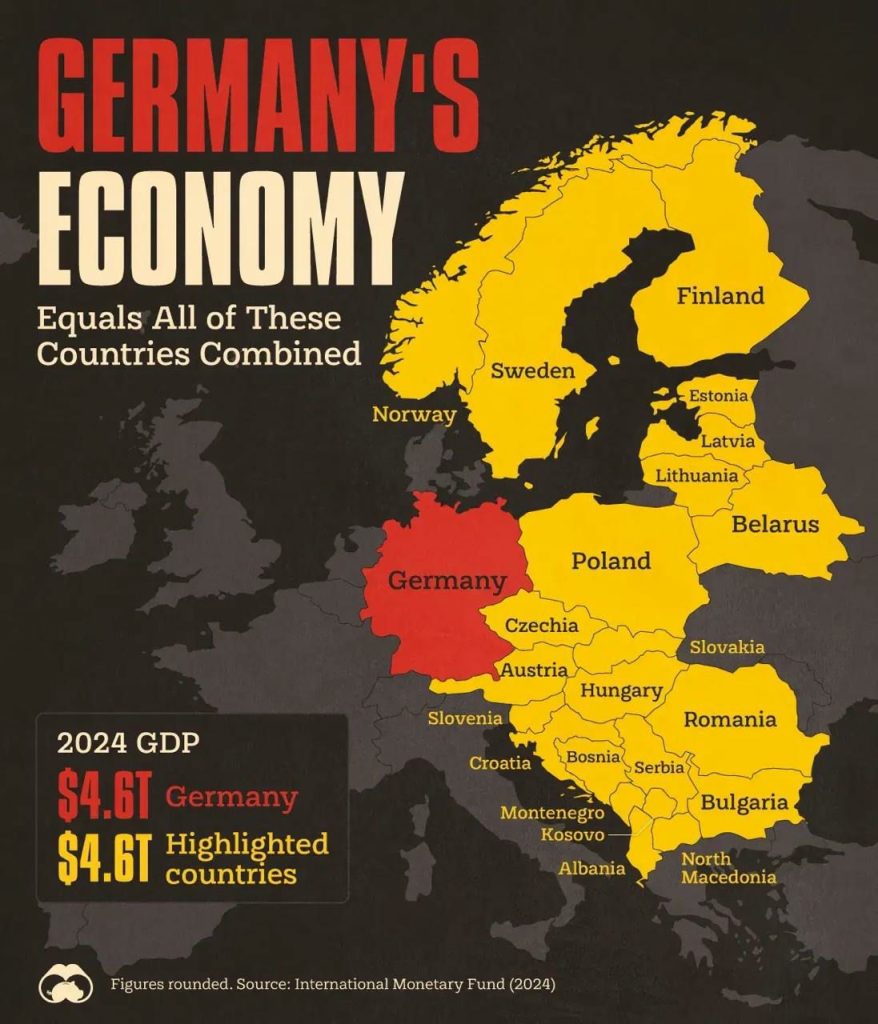
Germany’s Shadow: The Influence over the European Union
Farhad Reyazat – PhD in Risk Management , Fintech & Ai , University of Oxford ( Biography)
Germany’s economy, the largest in Europe and the fourth-largest globally plays a pivotal role in shaping European Union policy. This influence is rooted in its industrial strength, financial stability, and leadership in key policy areas. As of 2024, Germany’s GDP equals $4.6 trillion, a figure that matches the combined output of 21 other European countries, demonstrating its economic might within the continent.
The Future of Germany’s Economy and its Role in EU Policy
Germany’s future economic trajectory is poised to strengthen its dominance within the EU. Here’s how:
1. Sustained Industrial Leadership: Germany’s economy is heavily anchored in the automotive, manufacturing, and chemical industries. With innovations in electric vehicles and green energy, the country is positioned to lead Europe’s transition toward sustainability. The country’s investments in automation and digitization will further enhance its industrial efficiency, bolstering its competitiveness. As the EU pushes for carbon neutrality by 2050, Germany will likely lead policy discussions and drive technological advancements in renewable energy, green manufacturing, and infrastructure.
2. Financial Backbone of the EU: Germany’s commitment to fiscal responsibility and its financial contributions to the EU will continue to play a central role in maintaining economic stability. As Europe grapples with inflation, rising energy costs, and post-pandemic recovery challenges, Germany will be instrumental in shaping policies around financial support, debt management, and budgetary allocations. Future decisions on the EU’s monetary policy and the Eurozone will heavily depend on Germany’s economic outlook and influence.
3. Green Energy Transition and Economic Transformation: One of the critical factors driving Germany’s future is its commitment to Energiewende (Energy Transition), a policy focused on shifting towards renewable energy sources. As fossil fuels decline, Germany’s leadership in green energy solutions will be crucial for the EU’s climate targets. This shift will also reshape Germany’s economy, opening up new opportunities in green technology, energy storage, and climate-related innovation, securing its economic future and further solidifying its role as an EU leader.
4. Innovation in AI and Technology: Germany is making significant strides in AI, digitization, and Industry 4.0, which will likely transform its economic landscape in the next decade. As automation and artificial intelligence redefine industries, Germany is expected to lead in developing intelligent technologies that will impact sectors ranging from healthcare to logistics. The country’s push toward technological innovation will position it as a hub for high-tech investments and startups, securing its place at the forefront of Europe’s tech-driven future.
5. Shaping Migration and Labor Market Policies: With a rapidly aging population, Germany must address labor shortages by embracing migration and workforce development policies. The country’s ability to integrate migrants and skill development programs will be crucial for sustaining economic growth. As the EU continues to address labor market challenges, Germany will likely lead in formulating policies on immigration, workforce training, and labor market flexibility.
6. Key Player in Global Supply Chains: Germany’s manufacturing prowess places it at the heart of global supply chains, particularly in the automotive and machinery sectors. As supply chains evolve due to geopolitical tensions and the rise of nearshoring, Germany is expected to adapt by fostering stronger ties within the EU and globally. Its capacity to remain a reliable hub for production and exports will be critical to the EU’s strategic autonomy in the face of global uncertainties.

The image above provides a powerful visual representation of Germany’s economic strength compared to other European nations. The infographic highlights that Germany’s GDP in 2024 is projected to be $4.6 trillion, equivalent to the combined GDP of 21 countries across Northern, Central, and Eastern Europe. These countries include Sweden, Norway, Finland, Poland, Austria, Romania, etc.
Key Takeaways:
1. Germany’s Economic Power: Germany remains the largest economy in Europe and the fourth-largest globally, reinforcing its role as the economic powerhouse of the European Union. The fact that Germany’s GDP is equal to that of 21 other European countries showcases the sheer scale of its industrial and economic output. This dominance is primarily driven by its robust industrial base, which includes sectors such as automotive manufacturing, machinery, chemicals, and more.
2. EU Economic Leadership: Germany’s role in European Union policies and decision-making is heavily influenced by its economic might. As a major financial contributor to the EU, Germany has a significant voice in shaping fiscal policies, bailout packages, and budget allocations. Its economic health is a critical factor in the stability of the Eurozone, and its influence extends to matters such as trade, migration, and climate change initiatives.
3. Comparison to Eastern Europe: The highlighted countries include several from Eastern and Central Europe, which generally have smaller economies. Countries like Poland, Hungary, and Romania rely on Germany for trade and investment. Germany’s dominance in this region reinforces its position as a central hub in European supply chains and trade networks.
4. Economic Future: Looking ahead, Germany’s leadership in technology, green energy, and innovation is likely to strengthen its economic position further. With ongoing investments in automation, artificial intelligence, and the transition to renewable energy, Germany is poised to continue leading Europe into the future of sustainable and high-tech economies.
Conclusion:
Germany’s economy dominates the European landscape and sets the tone for the EU’s future. Its influence over smaller economies and its leadership in policy areas like energy and innovation will ensure its continued importance in the European Union. The future of Germany’s economy will undoubtedly impact the trajectory of the European Union. As Germany continues to innovate, lead in green energy, and maintain its industrial strength, its role in shaping EU policies will only grow. The next decade will see Germany spearheading sustainability, technology, and fiscal policy initiatives, ensuring that it remains a cornerstone of European stability and progress. Germany’s economy is not just a powerhouse today but well-positioned to drive the EU’s future into new realms of growth and resilience.






No Comments